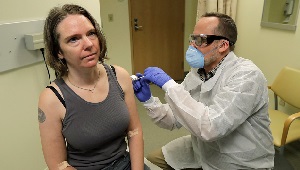COVID risks not meaningfully greater with estrogen-containing medications

Oral contraceptives, hormone therapy not linked to more severe COVID outcomes
It’s well known that estrogen-containing oral contraceptives and hormone therapy are associated with a greater risk of venous blood clots, although the risk for most people is still low. However, as scientists first began to study COVID-19, they noticed that patients with severe cases were experiencing abnormal blood clotting. Early in the pandemic, this awareness led to concern that people taking birth control or hormone therapy would be more susceptible to severe outcomes from the virus.
Now, a new study has found that current use of estrogen-containing oral contraceptives or hormone therapy did not meaningfully increase the risk of COVID-19 infection or hospitalization.
The study was led by researchers with Kaiser Permanente Washington Health Research Institute (KPWHRI). They found that, among women under age 50 with a COVID-19 infection, those using oral contraceptives had a 39% lower risk of hospitalization. Risk of getting a COVID-19 infection was no higher for women taking oral contraceptives than for those not taking the medication.
For women age 50 and older using oral estrogen-containing hormone therapy, the study found a modest, 19% higher risk of COVID-19 infection, but the researchers concluded this was unlikely to have a meaningful impact on their overall risk. Current hormone therapy use was not associated with a greater risk of hospitalization. Among women 50 and older with COVID-19, 19.8% of those not using hormone therapy were hospitalized, compared with 9.3% of those currently using hormone therapy.
"When the pandemic began, some medical organizations were recommending that women hospitalized with a COVID-19 infection stop taking oral contraceptives or hormone therapy containing estrogen," said Laura B. Harrington, PhD, MPH, an assistant investigator at KPWHRI and the lead author of the paper. "But at the time, there was no data on whether estrogen-containing medication use was associated with severe COVID-19 outcomes. So, we set out to get a clearer understanding of the relationship, and whether people actually needed to worry about increased COVID-19 infection or hospitalization risk if they are currently using oral contraceptives or hormone therapy."
There are several ways that estrogen operates in the body that could actually decrease the risk of COVID-19 infection or severe outcomes. Naturally circulating sex hormones have a role in detecting viruses, moderating the body's immune response, and influencing inflammation. Estrogen in the body decreases both the number of entry receptors for the virus that causes COVID-19 (SARS-CoV-2) and the amount of a protein on the surface of cells that makes it easier for the virus to enter.
“There was really a need for a better understanding of how these different mechanisms were impacting COVID-19 infection and severe outcomes such as hospitalization,” Harrington said. “Especially because stopping these medications can be incredibly disruptive for people, and not something that should be recommended if it’s not associated with meaningfully different risks.”
Study is first of its kind in U.S.
The study used data from health records for Kaiser Permanente members in Colorado, Washington, and the Northwest, and identified COVID-19 infections from the first year of the pandemic, between March 2020 and February 2021. Data for over 620,000 women (people who identified as female in the health record) were included in the study, with over 300,000 women between 18 and 50 years of age and about 320,000 women age 50 and older.
This is the first study in the U.S. to look at associations between estrogen-containing oral contraceptives or hormone therapy and COVID-19 infections, and the third study worldwide. Prior studies in other countries mostly relied on self-reported COVID-19 outcomes, which may underrepresent the true number of infections. For this study, researchers had access to COVID-19 testing results and diagnoses, as well as prescription-dispensing data for oral contraceptive and hormone therapy medications.
“We hope these findings can provide some reassurance to people using these medications,” Harrington said.
Other KPWHRI authors are Susan Shortreed, PhD; Rod Walker, MS; Sharon Fuller, BA; Lisa Temposky, BA; Ladia Albertson-Junkans, MPH; and Sascha Dublin, MD, MPH.
This work was supported by Kaiser Permanente's Garfield Memorial Fund, the Kaiser Permanente Center for Health Research, Kaiser Permanente Washington Health Research Institute, and the National Heart, Lung, and Blood Institute.
By Amelia Apfel
News

When is Paxlovid right for COVID-19 treatment?
New risk model uses advanced analytics to guide informed treatment decisions at Kaiser Permanente Washington.
research

Kaiser Permanente launches first coronavirus vaccine trial
On March 16, 4 volunteers received an injection of an mRNA vaccine for COVID-19 in an NIH-funded trial in Seattle.
News

KPWHRI begins new phase of flu surveillance
KPWHRI receives $10 million to continue vaccine effectiveness research for flu, COVID-19, and other respiratory diseases.



